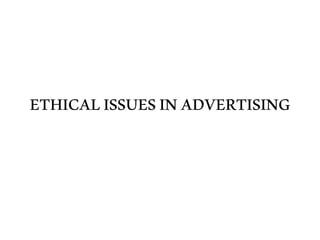Ethical issues in advertising
- 2. Introduction • Ethics in advertising means a set of well defined principles which govern the ways of communication taking place between the seller and the buyer • According to Vilhjalmur Stefansson ,”Ethical advertising uses the truth to deceive the public whereas Unethical advertising uses falsehoods to deceive the public”
- 3. ETHICAL ISSUES IN ADVERTISING • Advertisements that are – Drive Desire for Unnecessary Products – Deceptive – Offensive – Promote Unhealthy Products – Attracting people to consume unhealthy products – Create a Sort of Unsatisfied Society
- 4. ETHICAL ISSUES IN ADVERTISING Drive Desire for unnecessary products • Image source: www.deccanchronicle.com Offensive products • Image source: http://www.businessinsider.com/vintage- sexist-and-racist-ads-2011-6?IR=T#now-see-some-ads-that- arent-degrading-and-offensive-27
- 5. ETHICAL ISSUES IN ADVERTISING Deceptive Advertisement Image Source: http://reviews.financesonline.com/the-art-of-deceptive-advertising-reviewed/ puffery
- 6. CONT... Promote Unhealthy Products Surrogate Advertising Create a sort of unsatisfied society
- 7. ETHICAL ISSUES IN ADVERTISING • Concealment of Facts • Advertisements Using Children • Dangerous Stunts • Usage of Inappropriate Stereotypes • Subliminal Advertising • Manipulative Advertising • Puffery • Glorifying Glamorous Looks • Surrogate Advertising • Improper Language Usage
- 8. ETHICAL ISSUES IN ADVERTISING Advertisements using Children Dangerous Stunts
- 9. CONT... Usage of inappropriate Stereotypes Subliminal Advertising
- 11. Controlling Body to Check Ethical Issues in Indian Advertising • Advertising Agencies Association of India (AAAI) • Advertising Standard Council of India (ASCI)
- 12. Advertising Standard Council of India • Advertising Standard Council of India. Self Regulatory Organization (SRO) The objectives of ASCI are to make sure advertisers and advertisements are Truthful and Honest Not offensive Not hazardous to society Fair with competitors
- 13. THANK YOU
Editor's Notes
- Today, Advertising is the fifth largest industry. Advertisements have become part and parcel of our daily life; we come across many advertisements on television, magazines, radio and internet. Advertisements provide us valuable information about the products available in the market. But social, ethical and economic objections have been raised against advertising. Thus ethics in advertising means a set of well defined principles which govern the ways of communication taking place between the seller and the buyer. An ethical ad is the one which doesn’t lie, doesn’t make fake or false claims and is in the limit of decency. Ethics in Advertising is directly related to the purpose of advertising and the nature of advertising. Sometimes exaggerating the ad becomes necessary to prove the benefit of the product. Ethics also depends on what we believe. If the advertisers make the ads on the belief that the customers will understand, persuade them to think, and then act on their ads, then this will lead to positive results and the ad may not be called unethical.
- Using some specific sales strategy such as Limited Time Offer, Buy One Get one free etc. Example FlipKart Big Billion Day. According to the source, nearly a quarter of smartphone users and almost 30 percent of tablet users were satisfied with the advertisements they experienced on those devices. In comparison, 36 percent of users were satisfied with internet display ads, 47 percent with printed newspaper advertisements and 51 percent for television ads.
- Drive desire for unnecessary products:Using some specific sales strategy such as Limited Time Offer, Buy One Get one free etc. Example FlipKart Big Billion Day.
- Deceptive- Product that looks amazingly good in ads but not in real life. Example Food ads elevate fake into an art form.
- Advertisement attracts people consume unhealthy products like tobacco, alcohol, cigarette, noodles, cerelac (infant supplement to breast milk), etc. which might affect their health. In India, though there is a ban on advertising of such products, manufacturers are still able to advertise and remind their brand in many indirect means, for instance, manikchand Film Fare Awards, Kingfisher Mineral water, Teacher’s Achievement Awards, etc.
- Advertisers will try to present their product in the best light possible. As such, they will tell you all of the good, while concealing all of the bad. Or, they will tell you irrelevant information which may SEEM good, or be interpreted as good. For instance, your “fat-free” coffee creamer has the words “fat-free” in big font, but fails to mention that it is loaded with high-fructose corn syrup, which is far worse for you than the fats that naturally occur in milk products, and is far more likely to put pounds on you than natural milk fats. laims made about the characteristics of goods and services contain a false statement of fact. (Example: A product weighs 900g instead of 1 Kg) The price or manner in which the price is calculated, is misrepresented. (Example: Goods are not offered at sale prices, but advertised as such) The conditions of supply of the goods or service differs to that advertised. (Example: 'free delivery' actually involves a fee or charge) The attributes of the advertiser, (the advertiser's identity, assets etc.) were untrue. (Example: 'an Irish based company' turns out to be based abroad)
- .
- The Advertising Standards Council of India (ASCI), established in 1985, is committed to the cause of Self-Regulation in Advertising, ensuring the protection of the interests of consumers. ASCI was formed with the support of all four sectors connected with Advertising, viz. Advertisers, Advertising Agencies, Media (including Broadcasters and the Press) and others like PR Agencies, Market Research Companies etc. The Consumer Complaints Council is ASCI's heart and soul. It is the dedicated work put in by this group of highly respected people that has given tremendous impetus to the work of ASCI and the movement of self- regulation in the advertising.

